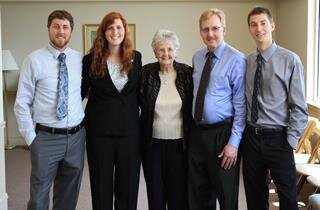How to Prepare for a
Funeral Arrangement Conference
Losing someone you love is one of life’s hardest moments. In the middle of grieving, you're also expected to make quick, important decisions—often during something called a funeral arrangement conference. If you’ve never been to one before, you might feel anxious or unprepared. That’s completely normal.
This guide is here to walk you through every step, so you can approach your meeting with confidence, clarity, and calm. We’ll explain what to expect, what to bring, questions to ask, and even offer a printable checklist to make things easier.
What Is a Funeral Arrangement Conference?
A funeral arrangement conference is a meeting with a funeral director to organize the details of a loved one’s final arrangements. It's where planning becomes action—and while that may sound overwhelming, the goal is to support you through it.
When Does It Happen?Usually within a day or two after a passing, often at the funeral home or via phone/video if needed.
Who's Involved?- Immediate family members
- Funeral director or planner
- Sometimes clergy or cultural advisors
You’ll make decisions like:
- Choosing burial or cremation
- Service style and timing
- Paperwork and permits
- Memorial touches and tributes

Key Documents and Information to Bring
Having the right items with you can help everything go smoother:
- Government-issued photo ID
- Social Security number of the deceased
- Any prepaid funeral contract or burial insurance
- Chosen clothing or accessories for burial/cremation
- Photos for the obituary or slideshow
- Military discharge papers (if applicable)

Questions to Ask During the Funeral Arrangement Meeting
You don’t have to know all the answers—but asking the right questions helps:
- What’s included in the funeral package?
- Can we customize elements like music, readings, or flowers?
- What are the cremation or burial options?
- What will the final cost be? (Ask for an itemized quote.)
- Are there time or religious restrictions we should know about?
- How long does the process take?
What the Funeral Director Will Ask You
This part is about honoring your loved one and getting the details right:
- Full legal name, birth and death dates
- Burial or cremation preference
- Type of service (religious, military, celebration of life)
- Obituary information and photo
- Service location and logistics

Emotional and Practical Tips for Families
This isn’t just about logistics—it’s about people and emotions. Here's how to make the process easier:
- Bring someone with you. It helps to have support.
- Take notes. You don’t need to decide everything on the spot.
- Divide responsibilities. Let each family member contribute.
- Set a budget early. Be upfront about what you can afford.

Common Mistakes to Avoid
Don’t let the pressure of the moment cause added stress later:
- Skipping the itemized cost breakdown
- Not asking for clarity on package inclusions
- Forgetting essential documents
- Making rushed decisions under emotional strain
Optional Services You May Want to Discuss
Want to personalize the service? Here are options to consider:
- Memorial slideshow or tribute video
- Floral designs and arrangements
- Light catering or refreshments
- Guest transportation
- Livestreaming for remote family and friends

Next Steps After the Meeting
After the conference, take these steps:
- Review and sign service agreements
- Write and publish the obituary
- Notify family, friends, and community members
- Begin preparing eulogies, readings, or photo displays
- Confirm all details with the funeral home
FAQs
How long does a funeral arrangement conference take?
Generally between 1–2 hours.
Can we handle everything online or remotely?
Yes, many funeral homes now offer virtual planning options.
What if we’re on a tight budget?
Ask about simplified services, payment plans, or community resources.
Can we change our mind about arrangements later?
Often yes—just clarify deadlines and cancellation policies.
